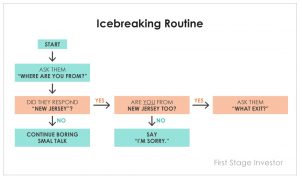Just how important is artificial intelligence (AI)?
Stephen Hawking said AI might be “the biggest event in human history.”
Siri or Alexa talking and listening to you? That’s AI.
Spotify and Netflix selecting your favorites? That’s also AI.
You’re going to hear a lot more about it in coming years, as it makes a growing impact on your life while also becoming a critical part of most companies’ competitive strategies.
Faster loans. Driving directions before you ask for them. Medications before the appearance of symptoms. Driverless cars avoiding bottlenecks before they get bad.
Most of these things are becoming available – or are about to – thanks to AI. It truly is a transformational technology. It can do things no technology before has done – like identify patterns… predict trends… recognize speech… and personalize products.
AI 101
Conceptually, AI is machines performing tasks that seemingly require human intelligence. The form of AI you’re most familiar with is machine learning, which involves giving algorithms access to a trove of data and letting them learn from their errors (sort of like humans!).
So what are these things called algorithms?
They’re sets of instructions (in the form of mathematical formulas) that take input through a series “rules” and processes based on data and provide output. They provide a path to get from a starting point to an end point. Here’s an example, a simple conversation centered around the most confounding of subjects: New Jersey.

Imagine that each of these boxes has a number rather than text. You could then make a mathematical formula representing the above. That’s an algorithm.
Now suppose you had more data on this person. Perhaps you know they’re from Pennsylvania. And for the sake of argument, let’s say people from Pennsylvania don’t like people from New Jersey. With those two pieces of data, AI would change its routine to become more sophisticated and add many more boxes (or options). One possible outcome could be, “Hey, at least you’re not from New Jersey.”
More data allow algorithms to learn and become more accurate and predictive.
In the real world, Facebook uses its algorithm to rank posts that can display on a user’s news feed. (Personally, I hate that it’s based on how likely a user is to have a positive reaction. It just promotes groupthink and noncritical thinking. Stop babying us, Facebook!)
AI Is Making Winners Out of Startups
It’s no accident that several of our First Stage Investor companies use AI. 2020 GeneSystems’ multicancer detection test has an AI layer that links demographic data to test results in order to fine-tune when a patient could be at risk.
Other companies in the First Stage Investor portfolio, such as Sickweather, Arbit, NowRx and Digital Brands Group, are collecting large amounts of proprietary data in order to to make use of AI at a later point.
As you might surmise, I discussed AI at length with the founders of these companies (prior to recommending them).
First, I wanted to be sure they were serious about AI and not putting it out there just to attract investment dollars. Second, I wanted to know exactly how they were planning to use AI. And third, I wanted to know what adjacent and competitive companies throughout the world were planning to do in the AI realm…
Because this space has become a race.
It will involve hundreds of companies from the U.S. and overseas. Most observers are predicting a two-country race for global AI supremacy. Some are predicting a second-place finish for the U.S.
The country that could outcompete American AI companies?
China. It’s focusing heavily on developing the best and biggest AI industry in the world.
China Pushing to Dominate AI
It started back in July 2017, when China’s State Council announced a heavily funded initiative – the “Next Generation Artificial Intelligence Development Plan” – backed personally by President Xi Jinping. The plan’s goal is for China to develop an industry worth some $150 billion and be the global leader and innovation hub of AI by 2030.
In China, the most important economic initiatives happen from the top down. The government means everything (and no government support is usually a deal stopper).
Deep-pocketed investors were paying attention. In addition to government funding, billions of dollars have since flowed into Chinese AI startups from China’s wealthy angel investors and cash-flush companies like Alibaba and Tencent.
China’s AI industry grew 67% last year, according to a recent report from Sen. Marco Rubio. China now publishes more scientific papers on AI than any other country.
Jim Breyer, a multibillionaire venture capitalist, thinks 8 out of the 18 most valuable companies 10 years from now will be Chinese AI outfits.
IDG Capital’s Hugo Shong thinks 10 of the 18 will be Chinese.
Both agree the rest of the top AI companies will be American. For AI startups as well as the industry as a whole, it’s a two-country race.
And there’s a great deal at stake.
The country that wins this race will dominate the financial markets, where AI has already made major inroads. And it will lead innovation in sectors as diverse as transportation, agriculture and healthcare (which ranks as the top industry for AI venture capital). The winner will also gain significant military advantages.
Russian President Vladimir Putin says, “Whoever leads in AI will rule the world.” Russia, however, lags behind.
The race is on. And startups will play a big part.
Good investing,
Andy Gordon
Co-Founder, First Stage Investor